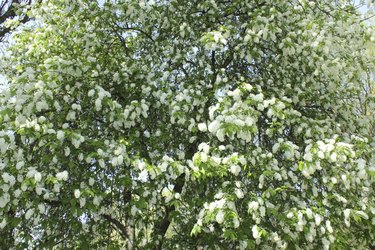
The tenacious hackberry tree (Celtis occidentalis), hardy in U.S. Department of Agriculture plant hardiness zones 2 through 9, withstands much that nature sends its way. Resilient and adaptable, it tolerates wide-ranging soils and urban pollution, and it usually scoffs at wind. But occasionally, the soft-wooded, rugged-barked tree becomes weakened by disease and branches give way in storms. When it does, the wood performs admirably in your fireplace or wood stove.
Going for the Burn
Video of the Day
Good firewood relies on several qualities to make your fires burn well. Hackberry obliges, starting with its easy-splitting nature. The wood is heavy, but that helps keep sparks and smoke at enjoyable minimums. The slight, pleasant fragrance adds a nice touch to the burn as well.
Video of the Day
Heating Things Up
In the all-important heat department, hackberry won't leave you lacking. Its BTUs fall short of prime hardwoods, but hackberry logs rate higher on heat than most other soft-wooded trees. The proof is the coals, which keep wood stoves burning reliably through cold nights.
Proper Seasoning
With all firewood, drying makes the difference between a sputtering fire and a quality flame. Hackberry's water content begs for proper preparation to deliver the fire you deserve. Age your hackberry wood one year to get the best it has to give, Dried hackberry logs burn much better than freshly cut or unseasoned wood.